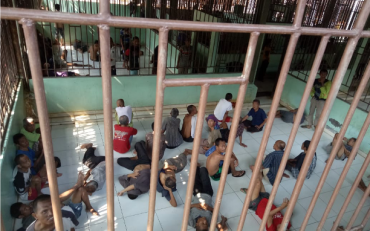This is one story as part of the Voices of People with Disabilities during COVID19 Outbreak series
Names may have been changed to protect the individuals mentioned in the story.
People in psychiatric institutions in Indonesia have little to no opportunity to protect or isolate themselves and are subject to institutional rules that they have little to no power over. Yet, the mainstream media is silent about them and the risk they are exposed to.
The Forgotten People
Over the last few weeks, as the COVID-19 pandemic has swept through one nursing home after another, it monopolized the headlines of mainstream media. But amid the struggles to cope with the spread of the COVID-19 pandemic in residential homes for older people across the world, why has mainstream media failed to also shed light on the grave situation in psychiatric facilities and institutions? Why, unlike the allegations of inhumane treatment and calls for high-level inquiries prompted by the spread of the virus in nursing homes, have we witnessed a total silence about the experiences of persons with psychosocial disabilities in psychiatric institutions? Why are we blind to the realities and the effects of the pandemic in the most vulnerable and susceptible communities? The situation in Indonesian psychiatric institutions may well supply us with an answer to these questions in the coming months.
Psychiatric Institutions in Indonesia—a “Petri Dish for Coronavirus Outbreaks”
Yeni Rosa Damayanti, a Chairperson of the Indonesian Mental Health Association, reported to the International Disability Alliance that the current pandemic-related conditions in “mental institutions” in Indonesia are quite worrisome. “Since mental institutions do not consider people with psychosocial disabilities as capable of thinking, almost all of them do not have access to information. There are no phones, no internet, no media, no television, they're cut off from the rest of the world and they're lacking in the information of COVID- 19,” says Yeni Rosa. The grim reality of closed psychiatric facilities in places like Indonesia and the stigma attached to persons with psychosocial disabilities puts them in a very vulnerable position.
To exacerbate the problem, psychiatric hospitals in Indonesia are operating beyond their intended capacity by housing an excess number of patients. This means crowded living spaces. “In many institutions, there are about 20-30 people with disabilities living in one room,” confirms Yeni Rosa. Social distancing—a strategy for slowing the spread of the novel coronavirus SARS-CoV-2 and easing the pressure on the health care system—is an unattainable goal in psychiatric institutions in Indonesia.
Besides the issue of close confinement, the psychiatric wards in Indonesia also lack disinfectants and basic sanitation supplies. “There is no facility to wash hands, and there is a lack of soap. There is no precaution taken by the staff to stop the spread of the infection brought from the outside,” says Yeni Rosa. Under current circumstances, “mental institutions in Indonesia”, in words of Yeni Rosa, may turn into “a perfect petri dish for coronavirus outbreaks.
Often times, the most vulnerable and marginalized members of society are left behind, and not just in a time of crisis. Their fate is not sufficiently addressed and exposed in mainstream media. It is in these shadow spaces like psychiatric facilities in Indonesia, where no light is shown, the coronavirus is likely to wreak havoc. The risk of the deadly outbreak in the psychiatric institutions in Indonesia is real, and the next couple of weeks will be telling how deplorable the situation is.

